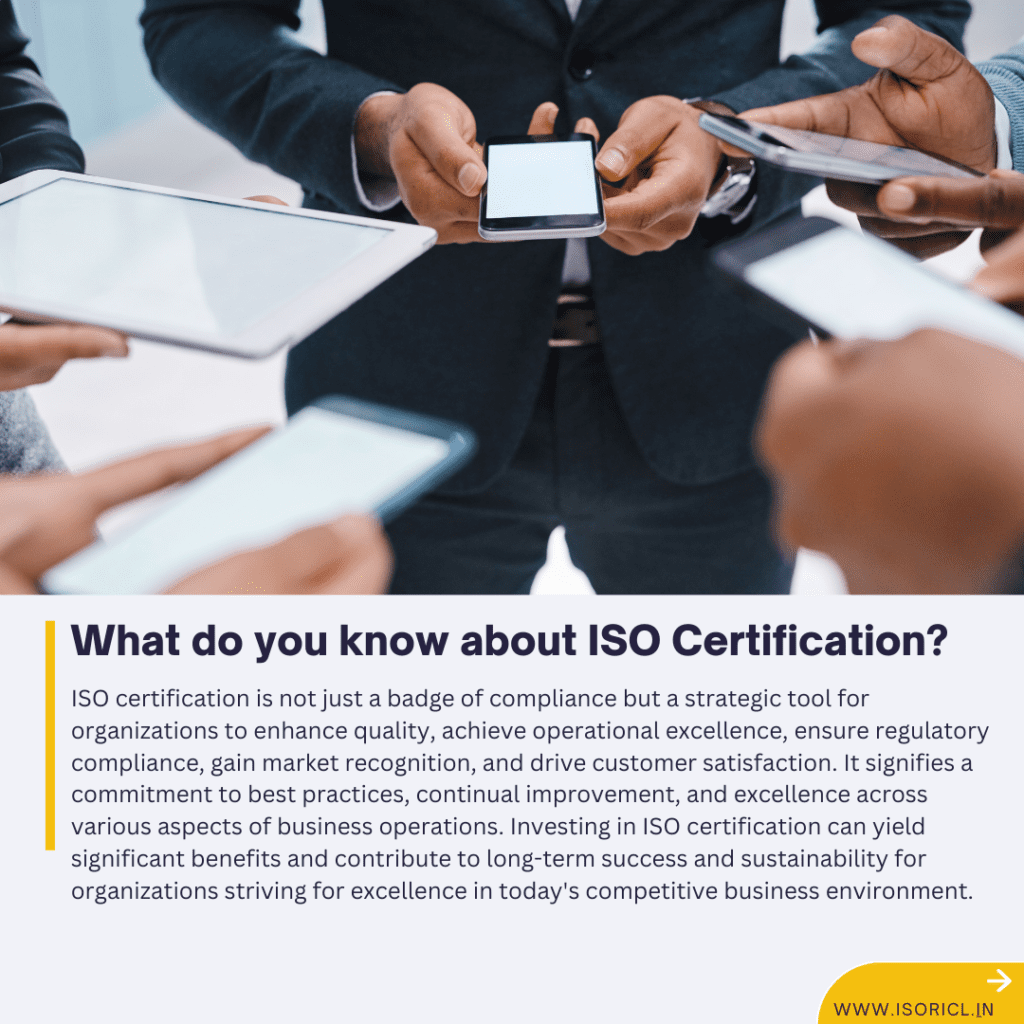What do you know about ISO Certification ?

ISO certification is a hallmark of quality, efficiency, and reliability for organizations worldwide. Developed and published by the International Organization for Standardization (ISO), these standards are internationally recognized benchmarks that ensure products, services, and processes meet rigorous criteria for safety, quality, and environmental responsibility. Achieving ISO certification involves a comprehensive process of implementation, auditing, and continual improvement, positioning certified organizations as leaders in their industries.
Understanding ISO Certification
ISO certification is not merely a badge of honor but a strategic tool that empowers organizations to demonstrate their commitment to excellence and continuous improvement. It encompasses a range of standards tailored to various aspects of business operations, each addressing specific requirements and guidelines relevant to industry best practices and regulatory compliance.
Key Benefits of ISO Certification
1. Enhanced Credibility and Market Reputation
ISO certification enhances an organization’s credibility and market reputation by signaling adherence to internationally recognized standards. Customers, partners, and stakeholders perceive ISO-certified organizations as reliable, trustworthy, and committed to delivering products and services of consistent quality.
2. Improved Operational Efficiency
Implementing ISO standards requires organizations to establish clear processes, procedures, and performance metrics. This systematic approach promotes efficiency, reduces errors, and enhances resource utilization. By optimizing operations and minimizing waste, organizations achieve cost savings and improve overall profitability.
3. Expanded Market Access
ISO certification facilitates access to new markets and enhances competitiveness. Many multinational corporations and government agencies require suppliers to be ISO certified, making certification a prerequisite for participating in competitive bidding processes and securing contracts.
4. Customer Satisfaction and Loyalty
ISO standards, particularly ISO 9001 for Quality Management Systems (QMS), focus on meeting customer requirements and enhancing satisfaction. By implementing these standards, organizations ensure consistent delivery of products and services that meet or exceed customer expectations. This commitment to quality fosters customer loyalty and strengthens relationships.
5. Environmental Responsibility
ISO 14001 for Environmental Management Systems (EMS) guides organizations in managing environmental impacts, complying with regulations, and improving resource efficiency. Certification demonstrates a proactive approach to environmental stewardship, contributing to sustainability goals and enhancing corporate social responsibility.
6. Regulatory Compliance
ISO certification ensures organizations comply with legal and regulatory requirements relevant to their operations. By aligning with ISO standards, organizations mitigate risks associated with non-compliance, avoid penalties, and demonstrate a commitment to ethical business practices.
7. Continuous Improvement
One of the core principles of ISO standards is continuous improvement. Certification requires organizations to regularly assess performance, identify areas for enhancement, and implement corrective actions. This iterative process fosters innovation, drives operational excellence, and ensures organizations remain adaptive in a dynamic business environment.
Conclusion
In conclusion, ISO certification is essential for organizations seeking to achieve and maintain excellence in quality management, operational efficiency, and customer satisfaction. By adhering to internationally recognized standards, organizations enhance their market credibility, expand their business opportunities, and contribute to sustainable development goals. ISO certification not only drives organizational growth and profitability but also strengthens stakeholder trust and confidence in an organization’s ability to deliver value consistently. As businesses navigate global markets and competitive landscapes, ISO certification serves as a strategic enabler for driving performance, managing risks, and achieving long-term success.

ISO 22000
Food Safety Management System

HACCP
Hazard Analysis and Critical Control Points

FSSC 22000
Food Safety Management Certification Scheme

ISO 22301
Business Continuity Management Systems

ISO 13485
Quality Management For Medical Device

ISO/IEC 27001
Information Security Management System

ISO 20000-1
Information Technology Service Management

ISO 42001
Artificial Intelligence Management System

ISO 41001
Facility Management System

ISO 21001
Educational Organizations Management System

IATF 16949
Quality Management For Automotive

TL 9000
Quality Management System for Telecom

AS 9100
Quality Management for Aerospace Industry

ISO 30000
Ship Recycling Management System

ISO 55001
Asset Management System





